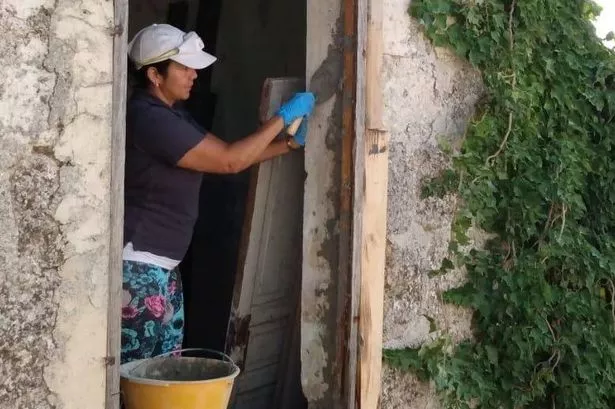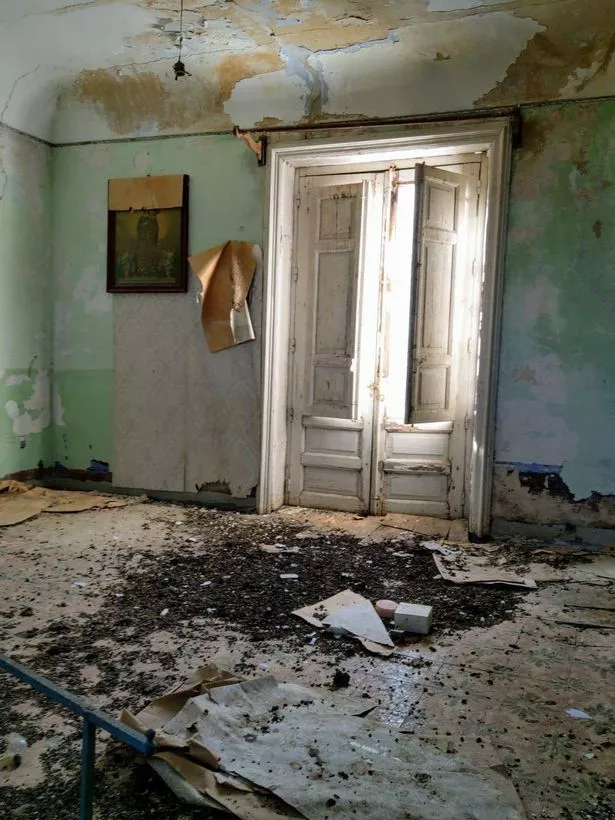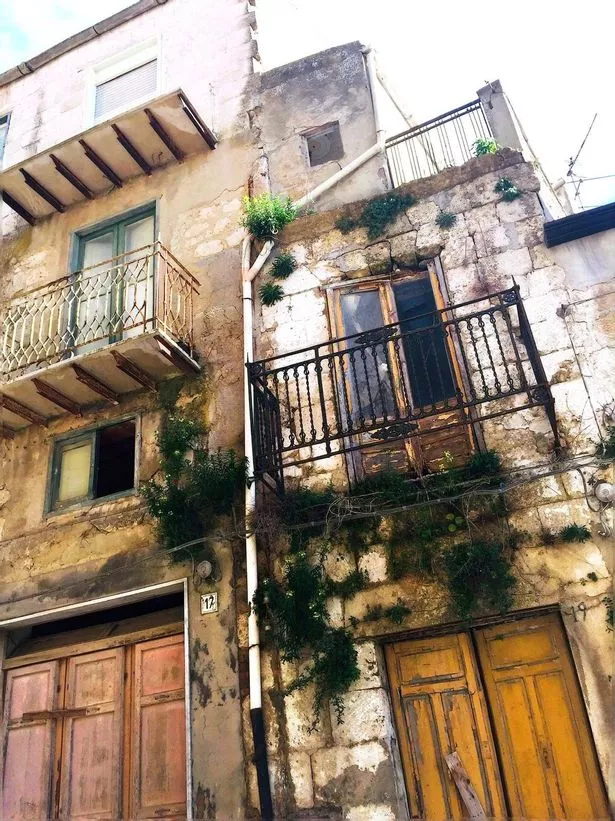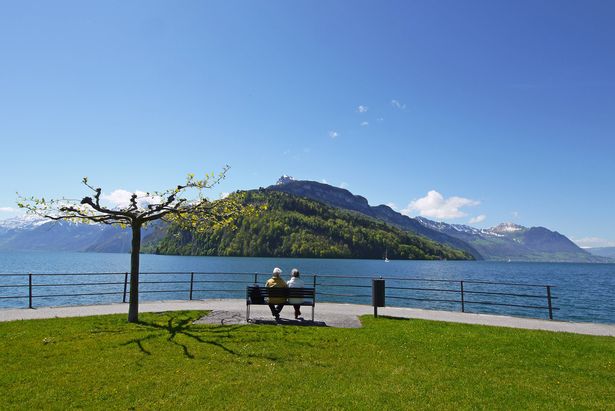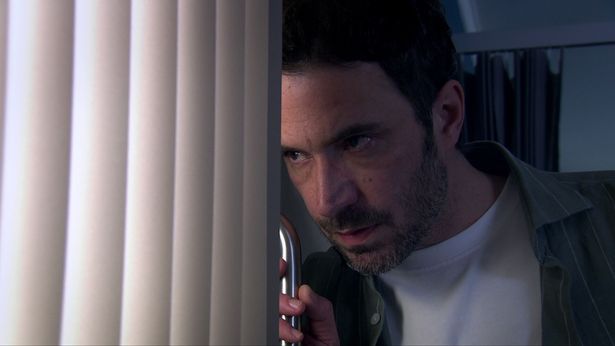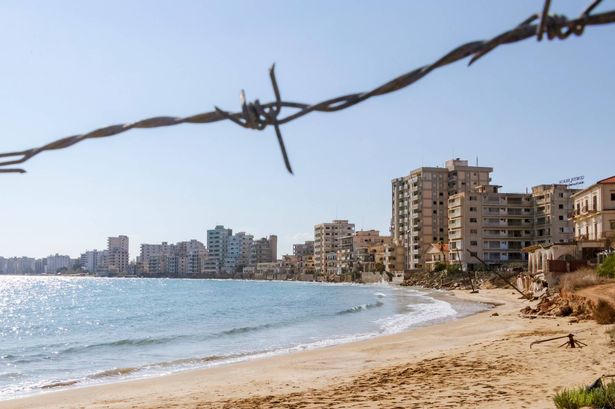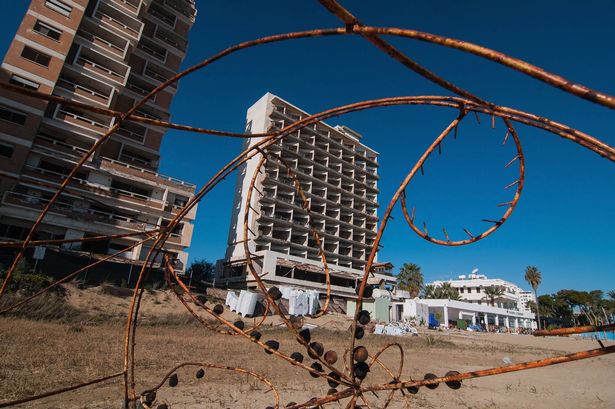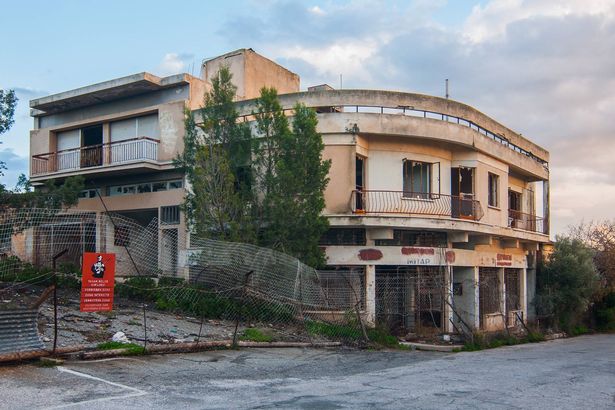Boy, 13, dies after jumping into Exeter canal and ‘failing to surface’ over Bank Holiday leaving family devastated
A TEENAGE boy has died after jumping into a canal and reportedly failing to surface over the Bank Holiday.
The 13-year-old was pulled from the water after jumping into the canal in Exeter, Devon, on Monday afternoon.
Emergency services had rushed to the scene shortly after 4.35pm, after concerns for a child’s welfare were reported in the south of the city.
He was rushed to hospital in a serious condition but tragically died at the medical centre.
In a statement, Devon and Cornwall Police said: “A 13-year-old boy has died after being pulled from the canal in Exeter.
“Emergency services were called at around 4.35pm on Monday 5 May, following a concern for welfare for a child in the canal at Clapperbrook Lane East.
“It was reported that a child had failed to surface after jumping into the canal.
“Police, fire, and ambulance services were in attendance.
“The boy was pulled from the water, before receiving first aid.
“He was taken to hospital in a serious condition, where he sadly died.”
Acting Superintendent Chris Conway said: “This is an awful and tragic incident, and we offer our condolences to the family who are being supported by specialist officers.
“We would ask that the privacy of the family is respected as they come to terms with their devastating loss.”
Police say the death is not being treated as suspicious, and added they will prepare a file for the coroner.
More to follow… For the latest news on this story keep checking back at The Sun Online
Thesun.co.uk is your go-to destination for the best celebrity news, real-life stories, jaw-dropping pictures and must-see video.
Like us on Facebook at www.facebook.com/thesun and follow us from our main Twitter account at @TheSun.
Woman buys six Italian homes for £5 in beautiful town and has big plans for them
Rubia Daniels, 51, paid just one euro for each of her six homes in Mussomeli, Sicily, in April 2019 and has been renovating the properties ever since. Now she is hoping to move there.
A woman snapped up six Italian homes for just £5 each and is now planning to move her family there.
Rubia Daniels scored a real estate hat-trick in Mussomeli, Sicily by taking advantage of a local council initiative encouraging the refurbishment of derelict houses, securing three properties for herself, one for her daughter, and another two earmarked for her aunties’ golden years.
“Buy your dream for €1 in the fabulous town of the Sicilian hinterland, just a few kilometers from the enchanting beaches and the historic temples of Agrigento,” the initiative’s website reads.
“In Mussomeli you will live the ancient Sicily, the real Sicily. Mussomeli is the city of the Manfredi’s Castle and traditions. In Sicily you will not only buy a house, but you will have the chance to experience our culture, our traditions, the slow and relaxed life of one of the most peaceful and safe lands in the world. Already 100 people have bought a house, what are you waiting for?”
READ MORE: Inside the ‘Mini Maldives’ of Europe with stunning beaches and crystal clear waters
While initial costs were a mere euro per house, adding admin fees, agency charges, and property deeds bumped the price to 4,000 euros (£3,400) each, totalling a neat 24,000 euros (£20,500). Some of these fixer-uppers came with fully caved-in roofs and were lacking essentials like water and electricity—nothing that Rubia, a seasoned planning consultant with 16 years under her belt in construction, couldn’t tackle.
After tearing down walls and executing renovations, several of her bargain buys are nearing completion, ready to welcome family and pals to join her in establishing roots in Mussomeli. Eager to capitalise on the scheme, Rubia was among the first to leap at the opportunity, juggling the paperwork to sign off on three abodes for herself and process acquisitions for her adopted offspring and two aunts.
Her aunts, Marilu Ferreira, age 70, and Marua Fatima, age 82, have their sights set on spending their retirement days blissfully in their very own Sicilian havens. Rubia, originally hailing from Brazil but calling San Francisco home since 1996, reminisced: “We bought all six in April 2019. In June, I did all the paperwork and then got the deeds later that summer.
“I packed six suitcases of all my tools and a generator, and then me, my husband and my brother-in-law, who was in Brazil, flew out to get the keys. The house was fully collapsed, but now it’s fully renovated and has a beautiful marble bedroom.
“Once the roof was fixed and water tight, the rest of it sort of fell into place from there. It’s been my passion and I just have so much feeling for these houses and the community as a whole.”
Rubia is confident that her profession equips her well for the challenge of transforming a dilapidated property into a stunning Italian abode. She said: “I’m very comfortable with the idea of transforming things and breaking walls. When I see something fully collapsed, I can already see what’s going to look like, which is not for everybody.
“For example, my husband panics when he sees me eyeing up projects like this, but for me it’s just a combination of excitement and joy. But you have to see beyond the way a place looks at the start, and imagine how it’s going to be in the end. And my ‘one euro’ home is exactly the way I imagined it, and I’m proud because it was a small investment.”
Rubia invested a total of 60,000 euros in renovating her first acquisition in Mussomeli, with the aim that she won’t need to undertake any further work ‘for 50 years’. However, she hopes to refurbish each of the remaining properties within this budget.
“My daughter’s one is almost done, we did a full remodel. I have a few changes still to make to mine, but it’s my aunts which are the ones we’re trying to move along the most now,” she continued.
The reaction from her social circle was one of disbelief initially: “When I first told my friends and family about it, they couldn’t believe it. They thought I was kidding when I said I was going to buy six. It can be intimidating, but you’re getting the house basically for free and you can turn that into whatever you desire and it’s just a really fun project – especially when your husband and entire family help out with the manual labour.”
For Rubia, keeping things as local as possible has been key. “We sourced all the furniture locally, everything is from that little town – the kitchen, the flooring, the mirrors, the bath and sink. But we wanted to do it with the community in mind. We love it here – it’s much nicer than California,” she said.
“People actually mean it when they ask you how you are, and it’s this social aspect which really attracted me to the area. Nobody is rushing around, everything is affordable. You can eat really well with very little money – a coffee and a croissant costs €1.50. In California, it’s a very stressful environment and everything is so superficial.”
Video: Germany’s Merz fails to be elected chancellor in parliament vote
Germany's conservative leader Friedrich Merz has lost in the first round of voting in parliament.
Source link
U.S. Weighs New Bosnia Moves, Such as Bombing Serb Guns
WASHINGTON — Declaring that the United States has reached a “hinge point” in its Bosnia policy, Secretary of State Warren Christopher said Tuesday that the Clinton Administration is actively considering a wide range of options to stop Serbian aggression, including some that were rejected earlier, such as allied bombing of artillery positions.
“We now face a worsening environment in eastern Bosnia that has horrified the world,” he told the Senate Foreign Relations Committee.
Christopher later joined other top officials at the White House to discuss a new list of difficult and dangerous measures to turn up the heat on Serbian forces.
While emphasizing that military action is possible, Christopher said President Clinton will act only in cooperation with other nations and will not go it alone.
“It is a hinge point to decide what steps might be taken and what are practical and what’s going to be done multilaterally, because I don’t think we intend to act unilaterally here,” he said.
But in separate radio interviews, the defense ministers of Washington’s two closest allies, Britain and France, demonstrated just how difficult it will be for the United States to fashion a military coalition to face down the Serbs.
Britain’s Malcolm Rifkind and France’s Francois Leotard said military action would disrupt United Nations relief efforts and endanger U.N. soldiers–largely British and French–who are delivering food and medicine.
“The U.N. mission in Bosnia is saving hundreds of thousands of lives,” Rifkind told British Broadcasting Corp. radio. For his part, Leotard said that the world should wait to see the results of new sanctions voted last weekend by the U.N. Security Council.
Defense Secretary Les Aspin, testifying to the Senate Appropriations subcommittee on defense, showed little enthusiasm for military action. He said that Clinton faces “a very, very difficult set of choices.”
But on Capitol Hill, the Administration was coming under increasing pressure to go beyond the U.N.-imposed sanctions, which have shredded the economies of Serbia and Montenegro, the two republics that form what is left of Yugoslavia, but have failed in their objective of forcing Bosnian Serbs backed by the government of Serbian President Slobodan Milosevic to end their bloody campaign of “ethnic cleansing.”
Sen. Joseph R. Biden Jr. (D-Del.) bluntly told Christopher that the situation has already gone far beyond “anything that you could conjure up” diplomatically.
“The West . . . has appeased Milosevic for so long that he has no reason to respond to our blandishments and our threats,” Biden said. “The world (must) stop bemoaning the fact that all our options are bad ones. They are all bad ones. We’ve got to pick a couple.”
Biden said that if the West had done nothing more than bomb artillery ringing the besieged town of Srebrenica in eastern Bosnia, “we would have saved hundreds of women and children who are being absolutely massacred right now.”
Christopher said the options under consideration include air strikes and exempting the Muslim-run Bosnian government from the U.N.-mandated arms embargo on all former Yugoslav republics. But he said there are drawbacks to all of the options.
Gen. John M. Shalikashvili, the North Atlantic Treaty Organization’s top military commander, told the Senate Armed Services Committee on Tuesday that allied bombing of Serbian artillery would have only a limited impact on the bloody conflict.
“There is no indication you can be sufficiently effective and sufficiently persuasive,” said Shalikashvili.
Christopher said that the Administration launched its policy review primarily because of growing concern about the suffering of the Bosnian population. But he said the conflict also threatens vital American interests.
High school boys’ volleyball: Southern Section playoff pairings
SOUTHERN SECTION BOYS VOLLEYBALL PLAYOFFS
TUESDAY’S SCHEDULE
(Matches at 6 p.m. unless noted)
DIVISION 1
Pool Play (Round 2 of 3)
Pool A
#8 San Clemente at #1 Mira Costa
#5 Beckman at #4 Corona del Mar
Pool B
#7 Redondo Union at #2 Huntington Beach
#6 Newport Harbor at #3 Loyola, Wednesday
WEDNESDAY’S SCHEDULE
(Matches at 6 p.m. unless noted)
QUARTERFINALS
DIVISION 2
Mater Dei at Edison
El Segundo at St. Francis
Burbank Burroughs at St. Margaret’s
Santa Margarita at Peninsula
DIVISION 3
Los Alamitos at Tesoro
North Torrance at San Marino
Warren at Santa Monica
Orange Lutheran at Mission Viejo
DIVISION 4
Westlake at Corona Santiago
Sherman Oaks Notre Dame at Santa Barbara
Dos Pueblos at Crean Lutheran
Sage Hill at Royal
DIVISION 5
Oak Park at Newbury Park
Esperanza at Wiseburn Da Vinci
Kennedy at California
Rancho Alamitos at Vista Murrieta
DIVISION 6
Rio Hondo Prep at Quartz Hill, 7 p.m.
Oxford Academy at Village Christian
OC Pacifica Christian at Laguna Blanca
El Toro at Yucaipa
DIVISION 7
Brea Olinda at Lakewood
La Serna at San Jacinto
San Gabriel Academy at Jurupa Valley
Brentwood vs. Hawthorne MSA at Bud Carson Middle School
DIVISION 8
Carpinteria at Lancaster Desert Christian, 4 p.m.
Katella at Southlands Christian
Channel Islands vs. Wildwood at Crossroads
Alta Loma at Avalon
DIVISION 9
Heritage vs. CAMS at McBride School, Long Beach
San Jacinto Valley at Firebaugh
Whittier Christian at Downey Calvary Chapel, 5 p.m.
Beverly Hills at Yeshiva, 6:30 p.m.
Note: Division 1 pool play (third round), semifinals in Divisions 2-9 May 10; Finals in all divisions May 16 or 17.
Israel security cabinet reportedly votes to increase military operations, occupation in Gaza

Israel’s security cabinet reportedly voted in favoer of a plan to increase its military operations in Gaza. File Photo by Mohammed Saber/EPA-EFE
May 5 (UPI) — Israel’s security cabinet voted over the weekend to reportedly increase military operations in Gaza, and to establish a permanent presence.
Sources familiar with plan shared details and the results of the vote with CNN, NBC News and ABC News.
An Israeli official told CNN the new plan for Israel’s war in Gaza involved “the conquest of territory and remaining there,” to displace the Palestinian population to southern Gaza and conduct “powerful strikes” against Hamas.
Officials also said the expansion of the conflict will be implemented gradually and provide opportunities for a new cease-fire and hostage release deals before U.S. President Donald Trump visits the region later this month. Trump is slated to land in Saudi Arabia, the UAE, and Qatar next week, but Israel is not part of the planned itinerary.
The cabinet meeting also reportedly involved a possible lift on the blockade Israel has placed on humanitarian aid deliveries into Gaza, which has been in place for over eight weeks.
Both an Israeli source and a U.S. State Department official told CNN the United States and Israel have discussed a method to deliver aid to Gaza that would bypass Hamas, and that a related announcement could be made “in the coming days.”
The Palestinian Ministry of Health says over 52,000 Palestinians have been killed in Gaza since the Israel-Hamas war began, which includes more than 2,400 since mid-March when a cease-fire that had been in place for two months was broken.
Beyond the Masks: The Mental Health Struggles of Nigerian Women (I)
Growing up between Ogun State and Lagos State, southwestern Nigeria, Suhayla Yusuf* still remembers the exact moment her Obsessive-compulsive Disorder (OCD) symptoms started. It was in her first year at the University in 2013- she had just performed the Muslim pre-prayer ablution and was heading to the mosque when a blasphemous thought came to her head.
Shocked and jilted, she desperately tried to brush it away. But every attempt just increased its intensity, leaving her feeling like a mess. As it persisted, she tried to use sleep to escape those thoughts, but they would be waiting the minute she woke up. For a while, she believed she had been cursed by God.
“I was going through a very mentally stressful period at school. I had failed a course, and it wasn’t my fault. I was ill and admitted for a week at the hospital because of the stress. I wasn’t used to academic failure at all, I had always been a straight-A student,” she explained.
Suhayla had always been a lover of words and learning, occasionally dabbling in poetry and spoken words. The thoughts grew more intense after she dropped out of school by choice after failing a pre-med course. She chose to study another course at the university, but she couldn’t go for two reasons: the intense shame of failure and a family member who was a lecturer at that same school.
“This family member was abusive, and I lived with them. I was under a lot of verbal abuse from them, and they confirmed that God was angry with me and that was why I failed,” she told HumAngle.
OCD is a mental disorder that is accompanied by intrusive thoughts known as obsessions. It can lead to repetitive behaviours causing distress and interfering with their everyday lives. OCD has different sub-types, and in Islam, Suhayla’s religious OCD is known as ‘Waswas’, which translates to ‘whisperings of the devil.’ Muslims who experience this version of OCD suffer from repetitive and compulsive behaviour in relation to acts of worship and cleanliness.
It affects an estimated two per cent to three per cent of people globally, with women having a 1.6 per cent higher prevalence rate than men. Hormonal differences and higher treatment-seeking rates in women contribute to this, leading to social isolation, physical health problems, emotional distress, and damage to relationships.
Those vicious thoughts then led to what she would later learn were compulsions. She would perform ablution multiple times before praying and would even pause in the middle of praying to do so again because she was unsure if she had done it right the first time. She would also do a cleansing bath every day for up to an hour in the bathroom, repeating the steps she believed she got wrong.
Suhayla would take pills that would force her to sleep because she constantly felt exhausted. Some days, she would wash buckets, bathroom slippers, door handles, and her hands in the bathroom over and over again to purify them. Her mother noticed something was amiss after she discovered that the soap she was buying kept disappearing rapidly because Suhayla had to ‘wash the impurities’ off the soap before washing her hands. It got so intense that during the harmattan season, her skin would become flaky and dry.
“Daily prayers were hard for me. I would be praying and then would imagine bowing to something else. I would get so afraid that I’ve ruined my religion. I avoided watching movies a whole lot, especially Yoruba movies with idols, because my brain would capture them and use them to torture me. Sometimes my thoughts were sexual and very random. I would shut my eyes so tight at how disgusting they were, and would feel shame for having them,” she told HumAngle.
OCD subtypes include contamination obsessions, violent or sexual obsessions, relationship obsessions, sensorimotor obsessions, and sexual orientation obsessions. These subtypes can overlap for some people.
The 29-year-old Quality Analyst’s days are filled with intense, disturbing thoughts, many of which she can’t bring herself to speak out loud. The thoughts sometimes slip into her dreams, evoking nightmares leading to insomnia.
There are moments when she believes she can “see” germs moving on surfaces, her brain constantly creates these vivid images like a film. Though this symptom has eased up over the years, if something she deemed “impure” isn’t “purified,” she can’t bring herself to stop thinking about it. She would even find herself dreaming about cleaning it.
“I spend a long time in the bathroom just cleaning up after peeing, and I don’t touch things in the fridge or freezer without washing my hands after. I sometimes have to count the number of times I clean something before it’s “pure.” People have to ask my permission before touching my things because I need to see their hands most of the time.”
Suhayla believes she is getting better over the years, and her symptoms have eased up in severity. It can still sometimes be very hard for her to distinguish between what is true and what is not.
Seeking help
Concerned about her situation, she asked her mother to accompany her to the Yaba Neuropsychiatric Hospital, where she was diagnosed with OCD, BPD, anxiety, and severe depression. The psychologist who attended to her started by shooting intense, uncomfortable questions at her, asking if she had experienced sexual abuse, especially by a close family member.
The psychologist insisted that he believed she might not have been telling the truth, even though she was. He later told her that if she used the little blue and yellow pills he would prescribe for her, it would work instantaneously.
With time, Suhayla was forced to learn that the pills did not perform magic, and that realisation made things worse for her. “I was self-harming at that point. I feel I didn’t have real therapy work done and was just downed with anxiolytics and anti-depressants. He [the psychologist] kept asking me to bring that abusive family member to one of these sessions, but I was not comfortable. So I decided to end therapy when I felt it wasn’t helping. He told me to resume sessions at school, but I didn’t, and just sought help through Islamic platforms and clerics,” she told HumAngle.
Suhayla focused on seeking help through the Islamic way since her OCD was majorly religious. She messaged an Islamic platform and told them about her condition. Instead of offering the help she needed, they insisted that her thoughts were from the devil.
According to Chioma Onyemaobi, a clinical psychologist, mental health issues are highly stigmatised. “Many people will view those having these problems as having spiritual problems, being weak, and more. This leads to shame and people being forced to keep things to themselves- due to this stigma, mental health professionals may not have the liberty to reach out to them,” the psychologist said.
Suhayla’s OCD tends to flare up during the muslim fasting period, and it was one of those intense periods that she dropped out of the university again. She could not get out of bed or cook and would only sleep. It was torturous to be unable to function even when she had examinations. She could only cry and curl into a ball on her bed, plagued by horrible nightmares.
When it persisted, one of her mother’s friends, a psychiatrist, put her on some medications for nine months. The side effect was very severe depression, so she eventually stopped that, too. Suhayla eventually dropped out of school and was later forced to go for what she described as a spiritual exorcism.
“I still have OCD, but it isn’t as bad as it used to be. Mentally, I feel altered, like there is a bit of fog that never goes away. I wouldn’t even know it’s there, but there are some days I feel a ‘light breeze’ in my head, like how my head used to feel before it all started.
“The fog clears, and I settle into the feeling because it’s so rare…I still feel like my failures are a reflection of God’s anger, but I’m trying to police my thoughts better,” she said.
Also, stress is a huge trigger for her sometimes, especially if the “nightmare period” starts. She currently sees an online therapist as a result of her workplace’s mental health benefits.
While the therapist had repeatedly advised Suhayla to file for leave at work, she is sceptical about opening up about her condition to anyone. The stigma for people with mental health struggles she witnesses prevents her from speaking up, and she believes that is one of the many reasons she hasn’t met anyone with her condition yet.
A similar story

For Rumi Wutoh*, her symptoms have always been lurking in the corners of her life for as long as she could remember. When she was in primary three, she couldn’t eat for a day and a half after a classmate, about four desks away, vomited in class. The smell stayed with her, causing her to spit continuously all day.
Now 36, she still can’t stand anything dirty. “I get very uncomfortable when I sweat, I hardly hug or shake people because I don’t like being that close to people, but the few people I love. I abhor public transportation, touching door handles or people’s phones, and shaking hands. I don’t share utensils, even when I was a child,” Rumi told HumAngle.
Genes, personality types, the structure of the brain, as well as dysfunctional environments, can increase the risk of developing OCD.
The biggest impact Rumi’s life has is on how it impacts her relationships and interactions with her family, friends, and the world in general. She has to try not to nitpick and overanalyse people. Many situations also seem to leave deeper impacts on her life than is normal, and she is also working on getting less bothered by situations outside her control.
“I came across the story on Instagram about three years ago about a dog being fed illicit drugs, and I still feel a profound sadness and sometimes an almost unbearable urge to know what happened after, because then I can sleep better knowing the dog is now in safe hands. I would pull out my hair, not only because I am empathising with the dog, but also because I hate that I can’t fix it.”
Rumi had always been interested in people and scientifically dissecting things. Sometimes, she would find herself mentally dissecting the people around her, fixing their eyes, noses, or aspects of their behaviour. Her memory is also incredibly sharp, making it hard to forget anything.
“I can still say word for word what certain people said around me when I was as young as 3 years old, and it has been proven to be accurate.” This has caused her to drift away from people over the years, as she can’t stand when people talk ignorantly. She believed this created distance in her relationships with those around her. So, she learnt to stop calling them out.
Rumi finds herself to be a walking contradiction. On one hand, she can’t stand being touched by others, but she may willingly hug her loved ones. Even though she can’t stand anything filthy, her room can be left unswept for a week when she is having intense moments of sadness, which she suspects may be depressive episodes.
Studies show that 25 per cent to 50 per cent of people with OCD can also experience severe depression. For some, the two conditions begin simultaneously, with more people showing up with symptoms of OCD first.
“I have never been diagnosed medically. I am not so keen on having people understand me as long as my loved ones do. Because would the world stop my pet peeves even if they understand how it makes me feel?” she explained.
Though depression can be an accompanying illness to conditions like OCD and BPD, depression itself is a mental health disorder that is very common in Nigeria. A study in Kano State shows a 70 per cent to 90 per cent depression prevalence in two specialist hospitals, with many left undiagnosed and untreated. This condition causes persistent feelings of emptiness, sadness, loss of pleasure in activities and feelings of worthlessness.
Speaking with HumAngle, Janet Peter*, said her diagnosis for chronic depression happened accidentally in November 2024, when she went to a psychiatrist for an Attention Deficit Hyperactivity Disorder (ADHD) analysis. Prior to that, she had struggled with a lack of energy, a lack of motivation, a lack of self-worth, constant sadness and the nagging feeling that she had nothing to live for.
The Fashion Design Intern assumed she had ADHD because she seemed to resonate with many of the symptoms she came across on social media and wanted to confirm that for herself.
“I’m not exactly sure when the symptoms started for me, but I believe my first major episode was in 2014. I was in my final year at the university, and I pretty much skipped school for most of the year. I would lock myself in, numb myself with binge eating and binge watching movies,” she recalled.
It led to her failing her finals woefully, and she had to make up for it for a year and a half. Her future looked very bleak for a long time, and she struggled to find her footing for 8 years after that.
Her diagnosis came at the Federal Neuropsychiatric Hospital, Yaba, Lagos, southwestern Nigeria, where she was based. She found the appointment days very stressful and struggled with the lack of order and nonchalance of the staff, making her feel like they had forgotten the patients were humans like them.
Another issue she had was with the length of the therapy sessions. Sometimes, a session can be as short as 5 minutes, and she always leaves feeling that more could have been done. In addition to the fact that there are only eight Federal Neuropsychiatric hospitals in Nigeria, only 3.3 per cent of the country’s budget is allocated to mental health services. Beyond the inadequate facilities, mentally ill patients are also treated badly in hospitals, and societal stigma makes it harder for people to seek help.
Janet finds the general situation of the country to be very triggering. Her medication helps her not to dwell too much on them. “I hope that one day I will be able to function without having to rely on medication. My doctor says I may have to use them for at least 5 years. That’s such a long time to be popping pills every morning, but what choice do I have?”
She added that if she knew 11 years ago what she now knows, she would have sought help much earlier and not tried to “pray” her troubles away.
In the same vein, 21-year-old Miracle Jacob* has struggled with numbness, dissociation from people and low self-esteem since she was 12 years old. Sometimes, she feels she has no real reaction to things, even when something very traumatic happens to her.
Her current financial situation is why she never sought help in Port Harcourt, Rivers State, southern Nigeria, where she is currently based. She does not have the privilege to spend money on mental health support, she said.
Studies show that Nigeria does not have a free psychiatric treatment program, causing a huge barrier in seeking help for many people.
“Mental health practitioners are also being cut out of health insurance, and because of that, people can’t really afford the services, and the high cost of mental health services makes it harder for people to access care. Mental health policies are also not being implemented as they should be,” Chioma, the clinical psychologist, says.
“Mentally, my condition puts me on a delayed reaction and makes me react to something months or years later. It makes me feel dead sometimes, and I have low self-esteem. Physically, I don’t really get to take care of myself,” Miracle explained.
Miracle constantly neglects herself, struggles to clean, do her laundry, repeats underwater because she is unable to wash them, and sometimes, goes days without being able to brush her teeth. This impacts her relationship with those around her.
“My mum and sister always complain, and I tend to attract people who just don’t have knowledge about proper hygiene or people who look down on me for it and shout at me all the time, especially male partners.” Sometimes, she is able to deep clean when things get very bad, allowing her to feel clean and refreshed for a little while.
Data shows that 1 in 4 Nigerians struggles with a mental illness and 15 million Nigerians die from suicide annually, ranking Nigeria as the most depressed country in Africa. But despite these, understanding and social acceptance of the condition remain poor.
Miracle currently copes by watching psychology videos and reading about depression online, and in her interpersonal relationships, she tries to be someone she is not in order to accommodate the people around her.
Chioma believes that updating and implementing the policies will go a long way in making mental health accessible. She also believes cultural norms and values in communities, shortage of mental health professionals, high cost of mental health services, domestic violence, political instability, and poor mental health policies in the country also affect access to mental health in Nigeria.
“Inflation, high cost of living crisis, unstable political crisis, lack of access to healthcare, emotional distress, and poverty contribute to the mental health crisis in Nigeria. Due to the high rate of unemployment, people are stressed, anxious, hopeless and are slipping into depression, which can lead to a high rate of substance abuse, crime and suicide,” she argued.
*The asterisked names are pseudonyms we have used at the request of the sources to protect them from stigma.
Little-known European town dubbed ‘world’s most beautiful’ with crystal-clear waters
Ed Chapman, a leading travel YouTuber, was obsessed with one particular Swiss lakeside paradise years before he finally got to visit – and he says it’s just like a “posh Benidorm”
A YouTube star who dreamed of visiting one of the most beautiful places in the world was stunned when he showed up.
Before becoming a top travel YouTuber, Ed Chapman had an obsession with one particular place. After years of dreaming about it, Ed has now achieved his goal of visiting the idyllic lakeside haven of Brunnen. But terrible weather put something of a damper on his dream.
Perched on the edge of Lake Lucerne in the heart of Switzerland, Brunnen has earned the title of “the most beautiful town in the world” from several visitors. Ed had always wanted to gaze into the lake’s clear turquoise waters, but there was a little problem.
Upon arrival, the usually charming town was hidden under less-than-ideal weather conditions, with relentless rain somewhat spoiling the view. But Ed didn’t let this dampen his spirits, donning a raincoat and pressing on.
“I just hope the sun comes out, because then it will prove my point about how beautiful this place is and perhaps my dream of coming here might be realised,” he said.
The enchanting spot has lured notable figures such as Queen Victoria and Winston Churchill, who spent his honeymoon beside Lake Lucerne, as well as famed painter JMW Turner, who captured the majestic mountains in several watercolours.
Even with the weather not on his side, Ed stayed hopeful, remarking: “Maybe it’s the most beautiful place in the world … we haven’t exactly had the sun yet, but I think tomorrow we might.”
On the last day of his trip, Ed’s patience was rewarded with a break in the weather. As the sun emerged, he exclaimed: “It’s a new dawn it’s a new day… we’ve got the sun!
“We haven’t quite got a clear view yet across the water. It’s still a little bit cloudy but at least the sun’s out hopefully it’ll continue to clear up as the morning goes on.
“We’ve got a few more hours here before we have to check out but I’m getting optimistic that we might get some you know some some clear skies.”
Despite the lingering clouds, Ed was captivated by the stunning mountain scenery and the lake’s vibrant turquoise waters. “That is incredibly turquoise,” he marvelled.
“It’s crazy how clear the waters are. I just love a mountain, I love a lake.” He noted the snow-dusted mountain peaks, remarking: “It doesn’t get much better than that.”
Ed even suggested the location could be one of the most beautiful places on earth.
His holiday concluded with a contented moment on his hotel balcony, drink in hand: “This is what it’s all about,” he laughed. “Sat on a balcony having a citrus drink looking at the view. It’s like a posh Benidorm.”
OpenAI says its nonprofit board will remain in control of its for-profit business
ChatGPT maker OpenAI said Monday that its nonprofit will remain in control over its for-profit business, as the startup moves forward with plans to change its organizational structure.
The move comes after a coalition of California nonprofits, foundations and labor groups called on the state’s attorney general to investigate OpenAI’s decision to transition its nonprofit’s commercial subsidiary to a for-profit public benefit corporation. The coalition raised concerns about how OpenAI’s charitable assets would be protected.
“We made the decision for the nonprofit to stay in control after hearing from civic leaders and having discussions with the offices of the Attorneys General of California and Delaware,” Chief Executive Sam Altman wrote in a letter to OpenAI employees.
OpenAI started in 2015 as a nonprofit research lab but later found success developing products and services like ChatGPT and text-to-video tool Sora. As the competition among AI companies heated up, OpenAI said it needed to change its structure to raise more money. The startup recently raised $40 billion, bringing its valuation to $300 billion, but part of that funding could change if it does not shift its corporate structure by the end of the year.
OpenAI received pushback on its transition plans from Meta and some philanthropic leaders, including the San Francisco Foundation, who raised concerns with the state attorney general’s office. The company also was sued by its co-founder Elon Musk.
On Monday, San Francisco Foundation said it continues to hold concerns about OpenAI’s transition.
“While we are glad to see that OpenAI is responding to the questions that have been raised about their proposed restructuring, its announcement today doesn’t address the fundamental problem at issue: the independence from profit-seeking of the OpenAI nonprofit,” Fred Blackwell, CEO of the San Francisco Foundation, said in a statement.
Last month, OpenAI named nonprofit commissioners, including labor leader Dolores Huerta, to help its nonprofit amplify its philanthropic efforts.
OpenAI said it will advance its public benefit corporation plan in continued conversation with its investor Microsoft, civic leaders, offices of the attorneys general in California and Delaware and the nonprofit commissioners.
The announcement provides clarity to the company’s original plans that it outlined in December, in which it said the public benefit corporation would “run and control OpenAI’s operations and business.”
On Monday, Altman said that the nonprofit board will become a “big shareholder” in the public benefit corporation “in an amount supported by independent financial advisors, giving the nonprofit resources to support programs so AI can benefit many different communities, consistent with the mission.”
Altman expressed commitment to OpenAI’s nonprofit continuing to control the for-profit business as it does today. “That will not change,” he wrote.
Other AI startups that are structured as public benefit corporations include Anthropic and Musk’s xAI.
‘We are suffering’: Displaced families bear burden of South Sudan conflict | Humanitarian Crises News
Malakal, South Sudan – One morning in mid-April, Nyandeng Meeth was fetching water from a borehole in Mat town, in South Sudan’s Jonglei State, before heading home to cook for her nine children and open her small street stall.
Suddenly, the sound of gunfire and shelling tore through the familiarity and routine of the 50-year-old mother’s everyday life. She remembers the town being plunged into chaos as people scrambled to save what they could – their families or a few belongings.
Afraid for her children, Meeth rushed home. “I [had] left the children at home when I went to fetch water,” she said. “I ran home, but when I returned, there was no one.” Along with the rest of the community, the nine siblings aged 7 to 15 had fled.
The attacks, reportedly by Sudan People’s Liberation Army-in-Opposition forces (SPLA-IO), were part of a broader escalation in fighting between government forces – the South Sudan People’s Defence Forces (SSPDF) – and opposition troops, including the White Army group aligned with First Vice President Riek Machar.
Since late February, violence has swept across Jonglei and Upper Nile states, displacing more than 130,000 people. Aerial bombardments and fighter raids have since emptied entire towns, disrupted aid and cut off vital trade routes from neighbouring Ethiopia.
The fighting is also prompting the country’s worst cholera outbreak in two decades, aid groups say, as patients fled medical centres where they were receiving treatment when the conflict broke out, spreading the disease in the process.
But for Meeth, recent events have revived the terror she felt nearly a decade ago, during an earlier phase of the conflict, when her husband was killed.
In 2013, just two years after South Sudan became an independent country, a civil war erupted between forces loyal to President Salva Kiir and those aligned with Machar. The war killed an estimated 400,000 people and displaced 2.5 million – more than a fifth of the population.
Meeth’s husband, who was a soldier, was killed in 2015.
Though a peace agreement was signed between the warring factions in 2018, disagreements over fulfilling the deal, including delayed elections, have kept the rivalry brewing.
Unresolved political disputes have driven cycles of violence over the years. But things escalated this year with clashes between government forces and opposition fighter groups, and the arrests of opposition leaders including Machar. The United Nations has warned that the country could be on the brink of a return to a full-scale civil war.

‘My life in Mat was better’
On that mid-April day in Mat town, more explosions rang out around Meeth, who had still not located her children. She ran towards the Sobat River, where panicked residents scrambled to flee across to neighbouring Upper Nile State.
In the crowd, she spotted her youngest daughter, 7, running alone towards the riverbank. She grabbed her hand, climbed into a canoe, and crossed, not knowing whether her eight other children had survived.
They landed in Panam, a town in Panyikang County in Upper Nile, about 2km (1.2 miles) from their home, where thousands of displaced families who have fled bouts of conflict from previous years are gathered, with little access to food, water, or medical care.
Meeth said she spent two anxious nights there, unable to eat or rest. “If your child is lost, you can’t be happy; even when I get food, I didn’t feel like eating it,” she said, sitting beneath a coconut tree that has now become her shelter.
Volunteers from the Panam community searched along the riverbanks and through the surrounding bushes for missing people. After two days, Meeth’s eight other children were found.
“Some of them hid in the river, while others stayed under the shades of trees,” Meeth said, explaining that her children could still hear gunfire from where they were, so they hid out of fear.
The ordeal had taken a toll on them. Their skin, she said, had gone pale from hunger and exposure, and their bodies were covered in mosquito bites.
Now, she and her children sleep under the coconut trees along the river, surviving on the roots of yellow water lilies and other wild plants, as fighting is still preventing aid access.
Before the latest wave of violence, Meeth supported her family in Mat by selling tea, sugar, and other household essentials from an informal stall. Sometimes, relatives returning from fishing would share their catch, helping feed the family when drought or floods ruined their harvest.
But the fighting has taken what little she had. “My life in Mat was better because I had shelter, I had a mosquito net and shoes, and access to a hospital,” she said. “I had two goats but had to leave them,” she added, saying relatives who fled Mat after she did told her the rebels had stolen her livestock.

‘Life is very difficult’
Even before the latest wave of fighting, daily life in South Sudan was marked by hardship.
The country ranks among the world’s poorest, and a recent World Bank report estimates that 92 percent of the population lives in poverty and nearly 7.7 million are facing crisis, emergency or catastrophic levels of hunger.
Not far from the Meeth family in Panam, 70-year-old Nyankhor Ayuel sat under the shade of another coconut tree with her seven children.
They fled from Khorfulus in Jonglei’s Pigi County in April.
“We were sitting at home with the children. We had already prepared food, and as we started eating, the shelling started,” she said. “We ran without any luggage or food.”
Though they escaped the immediate violence, Ayuel said hunger and illness now pose a different kind of threat. Pregnant and nursing mothers, she said, are suffering from diarrhoea and vomiting due to lack of access to clean water and food.
“Life is very difficult,” she told Al Jazeera. “There’s no food or medical facilities where we are staying.”
For families like Zechariah Monywut Chuol’s, who also fled Khorfulus, hardship has only deepened.
The 57-year-old father of 12 had just started building a permanent home for his family when the shelling began. “I was at home digging the foundation when it started. We ran to the riverbank and got into canoes,” he said.
Now, like so many others in Panam, Chuol and his family live under the trees, surviving on coconut water and whatever fruits they can find along the Sobat River.
“If hunger could kill like sickness, many people would have already died,” he said.

A fragile future
Across South Sudan, more than 9.3 million people – three-quarters of the population – require humanitarian assistance, according to the UN. Nearly half of them are children.
The conflicts in Upper Nile and Jonglei have brought all aid efforts to a ground halt. Aerial bombardment and danger forced aid agencies to withdraw staff, shut down cholera treatment centres, and stop aid deliveries.
This weekend, the “deliberate bombing of [a Doctors Without Borders] hospital in Old Fangak” in Jonglei killed several people, the medical charity known by its French initials, MSF, said.
Last month, the World Food Programme (WFP) paused operations in several areas due to access constraints.
Mary-Ellen McGroarty, South Sudan country director for WFP, said physical access can be challenging at the best of times. “But with active conflict, WFP cannot go up, we cannot go down the river. And these are areas where there are no roads, no cars, no trucks,” she told a UN press briefing at the time.
According to Peter Matai, director of the government-run Relief and Rehabilitation Commission, which works with international organisations to support the internally displaced, more than 30,000 people who fled violence in Pigi County are now sheltering in displacement sites such as Panam, where aid has yet to arrive.
“We’ve reported the situation to both the state government and international organisations,” said Matai. But several weeks into the fighting, “aid agencies are still waiting for clearance from the UN Office for the Coordination of Humanitarian Affairs to access displacement sites and deliver aid.”
With the violence ongoing and humanitarian access limited, thousands of displaced families remain in limbo, caught between conflict, disease and hunger – uncertain when, or if, it will be safe to return home.
For Meeth, who also serves as a deacon in the Episcopal Church of South Sudan, all she can do now is pray for her children’s safety, and hope that others will step in to help.
“We are suffering,” she said. “We need our people living abroad to hear that we are in a bad situation. They should help us provide for our needs.”
This piece was published in collaboration with Egab.
How parents on Universal Credit can get a £1,769 boost towards childcare
PARENTS on Universal Credit can get a £1,769 monthly boost towards the cost of childcare.
Anyone claiming the benefit and working or who has been offered paid work can get up to 85% of costs refunded or paid up front.
The boon comes via the childcare element of Universal Credit, with parents eligible for different amounts based on their circumstances.
The childcare element rose on April 7 by 1.7% – those with one child can now receive up to £1,031.88, from £1,014.63 before.
Meanwhile, those with two or more children can now get £1,768.94, up from £1,739.37 previously.
Of course, the amount you can get off the cost of childcare every month varies depending on your income during each assessment period.
Read more on Universal Credit
If you earn more than usual during one assessment period, the amount you get may go down.
You can use a free benefits calculator to find out how much you might get via www.gov.uk/benefits-calculators.
Previously, everyone on Universal Credit had to pay for childcare up front then claim it back.
However, since June 2023, you can claim the childcare element costs up front if you are looking to increase your working hours or are starting employment.
The Government brought in the change in a bid to get more parents back into work.
How the childcare element of Universal Credit works
You can use the childcare element of Universal Credit to cover the cost of holiday clubs, after-school clubs and breakfast clubs.
If you live with a partner, both of you need to be working for you to be eligible for help.
If you can’t get the childcare element paid up front you have to pay for any childcare costs yourself.
You then have to report them back to Universal Credit and it will pay some of the money back.
You can do this via your Universal Credit account.
You will need to have proof of your childcare provider and payments when reporting any costs via Universal Credit.
As proof of your provider, you need a contract, invoice or letter from them showing all of these:
- their name, registration number, address and phone number
- the names of your children that they look after
- the type of childcare, for example after-school or nursery care
You only need to do this once per provider.
Universal Credit might also ask to see proof of your payment showing the dates of childcare you paid for, how much you paid and the date you made the payment.
OTHER HELP FOR PARENTS
If you’re more than 10 weeks pregnant or have a child under four, you may be able to get help buying food and milk through the Healthy Start scheme.
Families on Universal Credit can apply online if their take-home pay is £408 or less from employment.
If you get Child Tax Credit, you may be eligible for Healthy Start if:
- your family’s annual income is £16,190 or less
- you do not get Working Tax Credit
You can check out the full list of support by clicking the link here.
You might also be eligible for a Sure Start Maternity Grant if you’re a new or expectant mother.
You also have to be on a host of benefits. The full list is:
- Income Support
- income-based Jobseeker’s Allowance
- income-related Employment and Support Allowance
- Pension Credit
- Child Tax Credit
- Working Tax Credit that includes a disability or severe disability element
- Universal Credit
Are you missing out on benefits?
YOU can use a benefits calculator to help check that you are not missing out on money you are entitled to
Charity Turn2Us’ benefits calculator works out what you could get.
Entitledto’s free calculator determines whether you qualify for various benefits, tax credit and Universal Credit.
MoneySavingExpert.com and charity StepChange both have benefits tools powered by Entitledto’s data.
You can use Policy in Practice’s calculator to determine which benefits you could receive and how much cash you’ll have left over each month after paying for housing costs.
Your exact entitlement will only be clear when you make a claim, but calculators can indicate what you might be eligible for.
Do you have a money problem that needs sorting? Get in touch by emailing [email protected].
Plus, you can join our Sun Money Chats and Tips Facebook group to share your tips and stories
Raid to Rescue Cuban Boy
I want to applaud the efforts of President Clinton and Atty. Gen. Janet Reno for getting little Elian Gonzalez removed–safely–from Miami. There are many sides to this difficult issue, but time had long passed for negotiation, and action was needed. The action was amazingly swift and error-free. This was the only conscionable thing that could be done by rescuing Elian from the clutches of political fanatics and returning him to his loving father.
We might hope that Elian and his father would apply for asylum now in this free country, but it’s really not our place to decide. And the residents of Little Havana in Miami have no right to decide either. It’s up to the father, who is Elian’s legal guardian. America did a decent thing, showing the world that we respect the rights of families and nations. Good job on Elian!
MARK BODZIAK
San Pedro
*
The Sunday front-page photos of a terrified Elian being abducted by armed men in the middle of the night sickened me. What an outrage! How can such actions be justified? We’re dealing with a little 6-year-old boy, not a wanted criminal. Reno should be removed from office.
The other photo of Elian smiling with his father, Juan Miguel Gonzalez, was almost as sickening and just as much propaganda as the video his Miami relatives made. Like many Americans, I was tired of the daily Elian reports, but today, Easter Sunday, I can honestly say I am ashamed to be an American.
MARLA L’ANGELLE
Valley Village
*
Finally, Elian is in the arms of his father, where he should have been in the first place.
MADELINE DeANTONIO
Encino
*
If President Clinton wants gun control, he has certainly picked a poor way to push the proposal. The photo of a government agent pointing an assault weapon at an unarmed man certainly validates that power truly does grow out of the barrel of a gun.
I suspect that any Clinton gun control proposals will fare poorly in Congress as a result of this unneeded and egregious use of force by the executive arm of our government.
DOUGLAS CAMPBELL
Culver City
*
Ah, now I understand. It is child abuse for relatives to point a camcorder at a child, but it is a caring act when a masked man points a machine gun at a child’s head. Thank you, comrade Reno, for enlightening me.
SUSAN STALZER
Santa Ana
*
I fully support the actions taken by Reno and the INS in removing Elian from the house of his distant relatives and reuniting him with this father, who had the legal and moral right to the custody of his son.
Am I the only one who thinks the family of Lazaro Gonzales and the Cuban community in Miami are wacko zealots?
LIA WILLIAMS
Aliso Viejo
*
I’m angry that it took Reno this long to act. As a parent, it disturbs me that people seem to feel that Elian’s Miami relatives were entitled to have any rights to him. I’m really horrified by the fact that this child had a father who wanted him and stepped forward to assume responsibility for him (when there are so many fathers who wouldn’t), yet that means nothing to a lot of people in this country. Whether or not we agree with the politics of Cuba does not mean that we have the right to withhold a child from his father.
The Miami relatives continued to come up with obstacle after obstacle when they had no legal or moral right to do so. The next time someone says that the INS had no right to enter the home armed consider two things: 1) The INS is a law enforcement agency, not a social services agency and 2) if it was your child being withheld from you, would you really be willing to give some crackpot relatives chance after chance after chance?
ASHLEY HOOKS
Inglewood
*
How ironic that George W. Bush and his cronies, who so vehemently oppose gun control, are up in arms when the Justice Department displays guns to enforce the law.
BERNARD ALTMAN
Los Angeles
* You hit the nail on the head with the use of the word “harsh” in your Sunday editorial, “Harsh but Right Action.” I guess we in America don’t care about how harsh we are anymore. All we need to do is satisfy our sense of justification and then it’s perfectly OK to break down doors of a family home and point guns at the occupants–including little boys.
Sorry, but I for one believe it’s time to rethink our approach as to how we do things in America. Unless there is real cause to believe that imminent danger to some occupant is involved, we can and should use other means to gain admittance into a private home.
LOUIS N. DeWITT III
Westminster
*
The outcry about the Elian raid suggests a new term: bleeding-heart conservative.
E.P. MACUS
South Pasadena
*
The Gonzalez family and their supporters seek to blame the INS for the way Elian was removed from their custody. The Justice Department negotiated endlessly with the Gonzalez family to try to ensure the peaceful transfer of the boy to his father. It was their continued defiance of a government order to surrender Elian that forced the INS to act. If emotional damage was inflicted, the Gonzalez family’s stonewalling and brazen disregard for the law is responsible for it.
The escalation of events could have been prevented by the Gonzalez family if they had been more concerned with the child’s welfare instead of their own political agenda.
Unfortunately, they will now most likely be rewarded by the American entertainment industry for their selfish actions.
GREG STONE
Barstow
*
The Gonzalez family didn’t like the policies of the Cuban government, so they left the country. Now they are unhappy with the policies of the U.S. government. Sounds like it’s time to move again! Please feel free to take several thousand of your friends with you.
STEVEN C. BOWIE
Pasadena
*
Thank God that the child is reunited with his dad. I hope this is the end of this boring soap opera. Now if they would arrest Lazaro and his daughter for kidnapping a child and holding him hostage perhaps they would stop playing to the cameras and becoming the stars of a crazy melodrama.
JOHN KOLIAS
Placentia
*
I would like to know why many Cuban Americans choose to fly the Cuban flag, which represents an oppressive communist nation, instead of the U.S. flag, which has given them many liberties such as freedom of speech and expression?
JOE MARTINEZ
Carson
*
It is now time for politicians of both parties to stop hiding behind the smoke screen of distraction they have created in the Elian case. The boy is back where he belongs, with his father.
Now they can devote time to convincing me how Washington will deal with problems that affect all Americans: inaccessibility to health care, gun violence in schools, the widening gap between rich and poor in this country, American jobs disappearing overseas, and a lot more pressing issues than what has dominated the front page for the last few months
PEGGY ANDERSON
Long Beach
*
Family law triumphs over political expediency–finally.
WILL WYCHE
Palm Springs
Messi 'does stuff that normal humans can't do'
Gary Lineker, Alan Shearer and Micah Richards discuss the finest solo efforts in Champions League history, which inevitably leads them onto Lionel Messi.
Source link
Investment firm 3G Capital acquires Skechers

May 5 (UPI) — Footwear giant Skechers, the world’s third-largest footwear company, announced Monday it had reached a deal to be bought out by the private equity firm 3G Capital.
3G will acquire the southern California-based Skechers for $63 per share in cash which represents a 30% premium to the shoe company’s current public valuation. It was unanimously approved by Sketchers’ board of directors.
“With a proven track-record, Skechers is entering its next chapter in partnership with the global investment firm 3G Capital,” company chairman and CEO Robert Greenberg, 85, said Monday in a release.
Stock shares in Skechers — only third behind other bigger companies like Nike and Adidas — bounced Monday morning over 25% after the announcement.
Greenberg, its founder, has been Skechers’ chairman and CEO since 1992 when he stepped down from the same roles at L.A. Gear, Inc.
“Over the last three decades, Skechers has experienced tremendous growth,” he added, giving a nod to the New York-headquarted 3G Capital and its “remarkable” history of “success” with other iconic global brands like Heinz in a $28 billion deal with Warren Buffett‘s Berkshire Hathaway, Popeye’s Louisiana Kitchen, Firehouse Subs and a 2010 deal to grab Burger King in a $4 billion buyout.
“We believe this partnership will support our talented team as they execute their expertise to meet the needs of our consumers and customers while enabling the Company’s long-term growth,” stated Greenberg.
Meanwhile, Skechers singed onto a letter last week by the trade group Footwear Distributors and Retailers of America singed by 76 footwear brands, include Adidas and Nike, which requested exemptions from President Donald Trump‘s staggering international tariffs.
“We are thrilled to be partnering with Skechers and look forward to working with an entrepreneur of Robert’s caliber and the talented Skechers team,” wrote 3G Capital’s co-founder and co-managing partner, Alex Behring and Daniel Schwartz, co-managing partner.
However, a source told CNBC that Trump’s growing trade war did not force Greenberg’s Skechers into a deal which 3G Capital has had its eye on for several years with 3G company officials looking at a long-term outlook with Skechers well positioned for future growth.
Behring and Schwartz called Skechers an “iconic, founder-led brand” with a track record of “creativity and innovation,” saying the 3G team is “built to partner” with companies like Sketchers.
“We have immense admiration for the business that this team has built, and look forward to supporting the company’s next chapter.”
Brunson, Anunoby, Knicks stun Celtics in Game 1, steal playoffs home court | Basketball News
New York Knicks upset the reigning champions Boston Celtics in Game 1 of their NBA Eastern Conference playoff series.
Jalen Brunson and OG Anunoby each scored 29 points as the visiting New York Knicks earned a 108-105 overtime victory against the Boston Celtics in Game 1 of their Eastern Conference semifinals playoff series.
The Knicks overcame a 20-point deficit in the third quarter on Monday night and sealed the win when Mikal Bridges stole the ball from Jaylen Brown after Boston inbounded the ball with three seconds to play.
“This team has fought all year, and been a pretty good road team,” Knicks coach Tom Thibodeau said. “It’s one game. There’s a lot of emotional highs and lows in the playoffs, but no matter what happens you have to keep moving forward.”
During the fourth quarter, Brunson tied the game at 89 with a 3-pointer, and at 91 on two free throws, before giving the Knicks their first lead since the second. His 3-pointer put them up 94-91 with 4:07 to play, and his third triple of the period extended New York’s advantage to six points, but Boston responded with a 7-0 run to take a 98-97 lead.
It was 100-100 when Brunson missed a layup with two seconds left. After a timeout, Jayson Tatum missed a 21-footer at the buzzer. The game went to overtime, where Anunoby’s dunk and foul shot and Bridges’ 3-pointer gave the Knicks the cushion they needed to finish the comeback.
“Your defence, your toughness, your teamwork – I think that’s paramount in a playoff game,” Thibodeau said.
Karl-Anthony Towns was in foul trouble for much of the game but had 14 points and 13 rebounds in 31 minutes. Josh Hart had 14 points and 11 boards, and Bridges recorded eight points, seven assists, six rebounds and three steals while playing 51 of the possible 53 minutes.
Brown and Tatum each tossed in a team-high 23 points for Boston. Tatum also had 16 rebounds, and Derrick White put up 19 points and 11 rebounds.
Kristaps Porzingis was scoreless in 13 minutes during the first half and didn’t play in the final two quarters with what the Celtics called an “illness”. Boston’s Sam Hauser also went to the locker room with an ankle injury with 28.5 seconds remaining in the third quarter and didn’t return to the game.
“Obviously it impacts the game with (Porzingis’) ability at both ends of the floor … Hopefully he’s ready for Game 2,” Celtics coach Joe Mazzulla said.

Boston led 26-25 after one quarter and outscored New York by 15 in the second quarter to take a 61-45 halftime lead. The Celtics scored the final eight points in the first half. The Knicks were 8-of-19 from the free-throw line in the half.
Towns was called for his fourth foul and went to the bench with 7:07 left in the third quarter, but the Knicks made a strong run without him. New York was within six points before Al Horford made a 3-pointer with 6.2 seconds remaining in the quarter that gave the Celtics an 84-75 lead entering the fourth.
“We left some of their good shooters open, so some personnel stuff, and they were able to get out in transition after some of our misses,” Mazzulla said of the Knicks’ comeback. “Detail stuff that we need to be better at.”
Game 2 in the best-of-seven series will be played on Wednesday in Boston.
“The biggest challenge in the playoffs (is) dealing with the emotions of the playoffs,” Thibodeau cautioned. “If you feel too good about yourself, you won’t be ready for Game 2.”
Emmerdale actor apologises to co-star after rage-fuelled row onscreen
One fiery Emmerdale scene that aired on the ITV soap recently left one actor saying ‘sorry’ to his pal and co-star on the show, amid a dark storyline for their characters
While there’s no love lost between Emmerdale villain John Sugden and his enemy Mackenzie Boyd, the same cannot be said for the actors playing them on the ITV soap.
Mack actor Lawrence Robb has nothing but praise for his co-star Oliver Farnworth, despite the sinister storyline between their characters. Lawrence called his pal and co-star Oliver “lovely”, when asked about his dark performance as killer John.
He made it very clear that the bitter feud between the characters onscreen stays just there, with him showing “love” for Oliver, or Ollie as he calls him, in real life. In fact one rage-fuelled scene between them that recently aired on the soap left actor Lawrence apologising to his co-star.
He shared a sweet message to Oliver moments after they cut from filming a scene where Mack and John once again butted heads. In the scene, Mack slammed John and warned him to stay away from his friend, John’s fiancé, Aaron Dingle.
Things took a bitter turn as the men began rowing over John’s recent actions coming to light. With that Mack warned John and sent him packing, and it was pretty aggressive.
READ MORE: Emmerdale star teases Mackenzie’s death as ‘dangerous’ John takes action
Of course it was all make belief for Mack vs John, and once the scenes were over everything returned to “normal”. With that, Lawrence told The Mirror and other press how he was left apologising to Oliver, feeling bad for how fiery things got for their fictional characters.
Not liking to shout at the “lovely” cast member the way Mack did to John, with Mack disliking the villain, Lawrence confessed he wasted no time in making peace. He said: “Ollie’s lovely. I remember when I turned him away when we had that shouting match outside Mill Cottage, when we finished shooting it was like, ‘Sorry Ollie, I love you!’ As soon as they shout ‘cut’ he’s back to a normal, jovial chap.”
The same could not be said for onscreen, with things set to get worse for Mack and John. Spoilers have revealed their feud continues with Mack keen to sabotage John on his stag do.
It leads to John heading off in pursuit of “his prey” Mack, and soon disaster hits the village. Details are being kept under wraps, but Lawrence has confessed he, like fans, is worried for his character.
He explained: “The thing is with John, he obviously killed Nate but he didn’t do it intentionally. Could he go all the way with Mackenzie? I absolutely do think so. If John were to fall into that kind of spiral of being a serial killer, Mackenzie would be right at the top of that list. So on that basis, Mackenzie’s life is in jeopardy.”
Mack could find his relationship with pal Aaron at risk too amid his feud with John. Lawrence told us: “That’s bound to happen. There were whisperings of that when Mackenzie told Aaron he sent John away.
“When someone’s in love the wool’s over the eyes, there’s rose-tinted glasses, your judgement is clouded when love is involved. I do think that Aaron does love John. Mackenzie is treading a path of not wanting to upset his mate but also ‘How do you not see what’s going on?’ kind of thing.”
Emmerdale airs weeknights at 7:30pm on ITV1 and ITVX, with an hour-long episode on Thursdays. * Follow Mirror Celebs and TV on TikTok , Snapchat , Instagram , Twitter , Facebook , YouTube and Threads .
Los Angeles Times Interview: James Leach : Viewing Whitewater as a Matter of Public Ethics
WASHINGTON — Not given to overstatement, Rep. James A. Leach of Iowa is the first to admit that, as scandals go, Whitewater is no Watergate. And yet by a twist of fate, Watergate was indirectly responsible for the fact that Leach now finds himself cast as President Bill Clinton’s chief congressional accuser in the controversy involving a failed Arkansas thrift and its ties to a real-estate venture half owned by the Clintons.
Two decades ago, it was Watergate and a confrontation with another President–Richard M. Nixon–that changed Leach’s life, propelling him into politics and setting him on a career path that would lead to the House Banking Committee, where he now sits as ranking Republican. Then a rising young diplomat with a masters degree in Russian studies, Leach had just been assigned to Moscow when Nixon fired Archibald Cox as special Watergate prosecutor in the Saturday Night Massacre. Outraged by the abuse of presidential power, Leach promptly resigned from the Foreign Service, saying his conscience no longer allowed him to serve in Nixon’s government.
Instead of Moscow, Leach went home to Davenport, Iowa, to help run the family propane-gas business. When he launched his first bid for Congress in 1974, only four people showed up for the rally. However, one of them, architect Elizabeth Foxley, became his wife the following year. They have two children. Elected on his second try in 1976, Leach has easily won reelection ever since.
Soft-spoken and almost priestly in demeanor–a colleague jokes that when Leach speaks, he expects “the words to come out in Latin”–Leach is, at first blush, an unlikely candidate to take on the President. Though a fiscal conservative, Leach is so liberal on social issues that his fellow Republicans frequently deride him as a “crypto-Democrat.” Indeed, Leach’s main targets have been Republicans–Nixon for Watergate, Ronald Reagan for Iran-Contra and the GOP leadership for its embrace of the religious right. He was a friend and defender of George Bush, but often voted against the latter’s positions.
Until now, Leach, 51, was perhaps best known for the crusade he waged in the Banking Committee during the 1980s, to stave off what he warned was an impending S&L; crisis by requiring thrifts to increase their capital and restrict speculative investments. At the time, he was widely ignored by both Democrats and GOP, who now ruefully admit they were wrong while he alone was right.
In Whitewater, Leach has an issue that friends say engages his two main passions: banking and public ethics. And in the party pariah, the GOP leadership has found an unlikely but useful champion–whose squeaky-clean record and history of nonpartisanship makes him nearly impervious to Democratic charges that he is only trying to embarrass Clinton for political reasons.
*
Question: The polls suggest Americans are still unsure what Whitewater is about and have trouble understanding the Clintons’ role in it. So to start with, what is Whitewater about and why should Americans care about it?
Answer: Whitewater is about conflicts of interest . . . involving a real-estate investment in which one-half of a partnership put in substantially more resources than the other half. They also involve the intermixing of taxpayer-guaranteed resources with a private venture, to the potential advantage of a public official. That is what makes the circumstance a public rather than simply a private interest. It should be stressed that on the public record is the fact that a failed savings and loan infused far more capital into Whitewater than then-Gov. (Clinton).
In a nutshell, you have a conflict of interest in multithousand-dollar proportions which may have contributed to multimillion-dollar losses for the taxpayer when the S&L; subsequently failed–due, in part, to its investment in Whitewater and other real-estate ventures of quasi-similar composition.
Q: You have been conducting your own Whitewater probe and have turned over the results to Special Counsel Robert B. Fiske Jr. What evidence did you find to show that money was diverted from Madison Guaranty to Whitewater?
A: We provided a series of check stubs that show money flowing (into Whitewater) from Madison-affiliated entities. Then there is on the public record the Madison Marketing $7,500 check that went to pay off a Clinton loan. Then (RTC investigator) Jean Lewis has indicated that she found approximately $70,000 going . . . into Whitewater over a six-month period alone.
So you have three precise sets of evidence. One is the $7,500 check; one is the $70,000 transfer, for which, by the way, there is also a check trail, and thirdly, the check stubs that relate to a series of small transfers in an earlier time period. That is the evidentiary circumstance laid on the table.
Q: And do you believe the Clintons were aware of at least some of these transfers?
A: If one views the former governor and former first lady of Arkansas as passive investors with little involvement in the deal-making ethos of the politics of the time in Arkansas, then it is credible to assume that they might not have known. On the other hand, if one’s assessment of (the Clintons) is a little more skeptical, one might reach a different conclusion. Those are judgmental elements at this time, not proven circumstances.
But let me stress that Whitewater also received an infusion of funds from a small-business investment corporation (Capital Management Services, Inc.) . . . and its former head, who has plea-bargained with the special counsel, has alleged that the governor urged him to make this particular loan and that the funds for this loan originally came from a substantial loan from the S&L; Madison Guaranty. So these are the allegations on the table, though they are by no means proven.
Q: Polls also indicate that most Americans believe the media is paying too much attention to Whitewater. How has the media handled it in your view?
A: Yes, we have given too much attention to the issue. My own sense is that what you have here is an issue of public ethics that deserves being raised–and then deserves being resolved. All the minority ever requested almost five months ago was for a hearing on the subject. If that hearing had occurred, this would have been a one-to-three-week issue. As it worked out, the decision to deny public accountability piqued public interest, and particularly press interest, and the issue escalated . . . . It’s one of the reasons why I have repeatedly suggested that, with full public disclosure and full accountability, I am more than willing–in fact, I am quite eager–to bring this issue to resolution. It’s my view that accountability is in order, but that a constitutional crisis is not.
Q: Republicans say Democrats are trying to keep Whitewater from coming out. But didn’t Republicans try to do the same thing with Democratic-driven probes like Watergate, Iran-Contra and Iraqgate–which you yourself opposed?
A: Wait just a minute. I am on the public record as supporting the Iraqgate inquiry. I was also Congress’ leading critic on the legal and constitutional implications of the Iran-Contra policy. I supported every investigation in the House Banking Committee–including those critical of a number of Republicans. In fact, I suggested the investigation of Republican Gov. (Fife) Symington . . . . The only investigation I had doubts about was the so-called October Surprise, which is the one issue in which George Bush was somewhat vindicated.
Now, I didn’t draw the same conclusion that everyone did (about Iraqgate) . . . . But I supported the decision to go ahead with the inquiry.
Q: You’ve been described as moderate and nonpartisan. But now some Democrats are saying that ambition has driven you to the right; that you’re looking for a party- leadership position; that you’re much more partisan now. Who is Jim Leach, and why is he so fixed on Whitewater?
A: First, let me say that I’m perplexed at all of the motivational queries. In all of the major (congressional) probes of the last several decades, no one .. . . questioned the motives (for holding them). In terms of party leadership, I’m not a candidate for any House leadership position, and I’ve made that very clear.
But if you’re looking for motives, part of it relates to a strongly held conviction that public ethics are not an issue of the left, right or the center. I feel this very strongly. To paraphrase Barry Goldwater, “Moderation in the pursuit of truth is no virtue and vigilance in defense of public ethics no vice.”
In terms of happenstances, I came to be the ranking member of the committee of jurisdiction over the S&L; circumstance . . . in which state governments in a small number of states played a significant role in the losses that occurred.
I’ve argued that there is a tripod of responsibility for the largest, single, domestic public-policy mistake of the century–the quarter-trillion-dollar S&L; debacle.
One part of the tripod relates to loose laws passed by a loose Congress; a second part relates to ideological decision-making within the Reagan Administration on deregulating an industry that demanded certain standards, and the third part relates to a small number of states–in particular, Texas, Louisiana, Arkansas, and California–which failed both at the regulatory end and at the legislative and executive levels to recognize their responsibilities to the deposit-insurance system . . . .
In Arkansas, the percentage losses were as extraordinary as they were in any state . . . . While Whitewater started out as just a basic real-estate development effort, by the time it was over, it had become a real-estate development effort that included substantial infusions of taxpayer-guaranteed resources . . . . In the end, it was the taxpayer that picked up the tab for some of the speculative investments of a political figure.
So all I would suggest is that motivational aspersions are no substitute for full disclosure. They are not answers to the questions raised.
Q: Are you under pressure from the GOP leadership to press ahead with your probe?
A: No, sir.
Q: What about the motives of some of your more partisan colleagues?
A: I am very ill at ease with speaking about partisanship, but I will say this: It is a responsibility of all minority parties in all Western democracies to shine the spotlight of embarrassment on the ruling or governing parties when they breach the law or breach public ethics.
I also believe it’s the constitutional duty of a member of Congress to oversee the executive branch . . . . By chance, as the ranking member of the committee of jurisdiction, a little extra responsibility has fallen on my shoulders. Not by choice, but by circumstance.
Q: The Democrats say they will allow Whitewater hearings only if they don’t interfere with Fiske’s investigation. Are you confident that hearings will be held?
A: It’s more likely they will be held in the Senate than in the House . . . . But I have some doubts that full-blown hearings will be held.
Q: Will you press the issue when Congress returns from its spring recess?
A: This is a good time for a bit of a respite. There is no individual in America who would be happier to put this issue behind them more than I–with the possible exception of the President and the First Lady.
Q: Are you saying you are not going to press for hearings, that you’ve made your case and are ready to let things lie as they are for a while?
A: No, no . . . . But my own sense is that now would be a good time to give the special counsel a little bit of rope to proceed. While Congress has historically had in-tandem probes with U.S. attorneys or special prosecutors, there is no necessity that they occur at this time. A little slack isn’t inappropriate.
Q: Are you confident Fiske will do a thorough job in his investigation?
A: I firmly believe Fiske is a very honorable man and that he will do a very honorable job. If I were to give him any advice, it would simply be to give the President of the United States the benefit of the doubt at every turn.
Q: The Democrats fear Republicans will use Whitewater to sidetrack health care and other issues on Clinton’s legislative agenda. What is the likelihood that Whitewater will overshadow the congressional agenda?
A: I personally, totally and completely concur that it’s crucial we not let an issue like this sidetrack the three main agenda items of this year in Congress–which are health, welfare reform and crime legislation . . . . But the way you put Whitewater behind is to have full disclosure and full accounting. Unless and until you do, Whitewater will continue to have a momentum of its own.
Monday’s high school baseball and softball scores
MONDAY’S RESULTS
BASEBALL
City Section
Banning 9, Rancho Dominguez 2
Bell 3, Legacy 0
Carson 6, Narbonne 3
Cleveland 11, Chatsworth 7
Crenshaw 17, Hawkins 7
Fairfax 7, Vaughn 3
Fremont 6, Dorsey 1
Garfield 1, South East 0
Jordan 20, Washington 2
King/Drew 8, Harbor Teacher 4
Maywood Academy 9, Elizabeth 1
Maywood CES 2, Marquez 1
North Hollywood 3, San Fernando 1
San Pedro 21, Gardena 2
Sotomayor 7, Torres 2
South Gate 12, Huntington Park 2
Stella 15, Animo Venice 1
Sun Valley Magnet 14, Community Charter 4
Sylmar 5, Kennedy 3
Valor Academy 20, Valley CES 5
Verdugo Hills 3, Poly 2
West Adams 5, Diego Rivera 4
Southern Section
Ambassador 4, Environmental Charter 2
Aquinas 4, Linfield Christian 2
Bosco Tech 9, Mary Star of the Sea 4
Brentwood 2, de Toledo 1
California 3, Warren 1
Camarillo 13, Oak Park 0
Chino Hills 4, Upland 1
Coachella Valley 2, Indio 1
Compton Centennial 8, Morningside 6
Cornerstone Christian 17, Perris 0
Covina 4, Rowland 2
Crean Lutheran 2, Garden Grove Pacifica 1
Crespi 9, Chaminade 4
Crossroads 15, Rolling Hills Prep 2
Culver City 12, Lawndale 0
Cypress 6, El Modena 2
Damien 8, Rancho Cucamonga 0
Desert Christian 12, Valley Torah 2
Dominguez 9, Compton 1
El Dorado 18, Villa Park 2
El Rancho 4, Whittier 0
Estancia 12, Garden Grove 2
Foothill 3, Dana Hills 0
Foothill Tech 4, St. Bonaventure 1
Grace Brethren 6, Heritage Christian 4
Harvard-Westlake 11, Loyola 3
Hawthorne 4, Inglewood 3
Hemet 15, San Jacinto Valley Academy 7
La Canada 3, Temple City 2
Laguna Hills 16, Santa Ana Calvary Chapel 3
Lancaster 4, Ridgecrest Burroughs 0
La Sierra 3, Rubidoux 0
Knight 11, Antelope Valley 4
Marshall 12, El Monte 0
Milken 9, Buckley 1
Montebello 2, Los Altos 1
Muir 9, Pasadena 4
Murrieta Mesa 2, Great Oak 0
Northview 9, Hacienda Heights Wilson 0
Oaks Christian 12, JSerra 3
Oxnard 5, Canyon Country Canyon 3
Oxnard Pacifica 6, Channel Islands 0
Patriot 3, Ramona 0
Riverside Prep 13, Glendale 3
Rosemead 5, Gabrielino 2
San Dimas 3, Colony 0
San Jacinto Leadership 1, Hamilton 0
San Marino 10, South Pasadena 2
Santa Fe 2, La Serna 0
Santa Monica 3, Leuzinger 0
Schurr 11, San Jacinto 5
Sherman Oaks Notre Dame 1, St. Francis 0
Sierra Canyon 6, Bishop Alemany 3
Simi Valley 6, Royal 4
Sonora 4, Esperanza 1
South El Monte 3, Arroyo 0
South Hills 4, Alta Loma 0
St. Anthony 7, Oxford Academy 3
Sunny Hills 8, Yorba Linda 4
Tahquitz 2, Adelanto 1
Temecula Valley 6, Murrieta Valley 5
Torrance 9, Long Beach Wilson 4
Trinity Classical Academy 12, Vasquez 4
Troy 9, Brea Olinda 5
Vista Murrieta 7, Chaparral 0
West Covina 7, Charter Oak 1
Whitney 14, Western 2
Wiseburn Da Vinci 13, Shalhevet 1
Yucaipa 4, Cajon 3
Intersectional
Granada Hills 4, Hart 3
SOFTBALL
City Section
Banning 6, San Pedro 4
Birmingham 11, Chatsworth 1
Bishop Conaty-Loretto 15, Fairfax 0
Carson 26, Gardena 0
Community Charter 12, Sun Valley Magnet 5
Contreras 23, Belmont 0
Discovery d. Valor Academy, forfeit
East Valley 22, Fulton 11
Hamilton 4, Westchester 2
King/Drew 9, Fremont 0
LA Leadership Academy 13, Smidt Tech 8
Marshall 5, Lincoln 4
Middle College 30, Animo Robinson 1
Narbonne 22, Rancho Dominguez 5
Orthopaedic 19, Animo Bunche 6
Palisades 25, University 18
Port of LA 20, Dorsey 0
Sherman Oaks CES 13, VAAS 2
Venice 26, LACES 0
Washington 17, Jordan 6
Southern Section
Aquinas 4, Linfield Christian 1
Bishop Alemany 13, Marymount 2
Bishop Conaty-Loretto 15, Fairfax 0
Brea Olinda 11, Troy 0
California 11, Whittier 0
Camarillo 6, Oak Park 0
Charter Oak 8, West Covina 1
Citrus Valley 16, Cajon 10
Covina 4, Rowland 3
Diamond Bar 9, Walnut 4
Downey 11, Lynwood 0
El Monte 16, Marshall 2
El Rancho 5, Santa Fe 4
Etiwanda 14, Upland 7
Fillmore 1, Hueneme 0
Flintridge Sacred Heart 23, Immaculate Heart 0
Gabrielino 12, Rosemead 6
Garden Grove Santiago 11, Anaheim 1
Garey 13, Baldwin Park 2
Grace Brethren 5, Santa Clara 1
Huntington Beach 19, Corona del Mar 2
Indio 16, Coachella Valley 0
Keppel 16, Ramona Convent 8
La Canada 6, South Pasadena 1
La Sierra 16, Rubidoux 6
Loara 18, Westminster La Quinta 12
Long Beach Wilson 19, Compton 0
Los Amigos 8, Western 4
Marina 13, Newport Harbor 2
Mission Viejo 3, Tesoro 2
Monrovia 16, Temple City 11
Newbury Park 5, Buena 4
Northview 5, Hacienda Heights Wilson 2
Oxnard 8, Oxnard Pacifica 1
Palos Verdes 6, Peninsula 0
Pasadena Poly 8, Flintridge Prep 5
Pioneer 5, Artesia 4
Providence 17, Westridge 5
Ramona 8, Patriot 4
Rancho Alamitos 21, Century 5
Redondo Union 13, Mira Costa 0
Rio Hondo Prep 13, Mayfield 7
San Dimas 16, Duarte 6
Santa Ana Calvary Chapel 11, Katella 7
Santa Ana Valley 12, Estancia 0
Sherman Oaks Notre Dame 16, Harvard-Westlake 6
Sierra Canyon 14, Louisville 2
South El Monte 12, Arroyo 1
St. Genevieve 16, Pomona Catholic 6
Temecula Prep 22, California Lutheran 12
Torrance 16, South Torrance 2
University 15, Laguna Hills 1
University Prep 19, Adelanto 9
Valley Christian 13, Village Christian 2
Vasquez 20, Desert Christian 3
West Torrance 8, North Torrance 2
Wiseburn Da Vinci 12, Culver City 1
Workman 18, Pomona 5
‘I visited European seaside resort that’s been left to rot for 50 years’
Once a playground for the rich and famous, the city’s glamorous resorts, skyscrapers and shopping areas have been left to rot for decades. It looks very different nowadays
Strolling through Varosha today, visitors can’t help but feel they’ve stepped onto the set of a disaster movie. But this wasn’t always its story. Once the crown jewel of the Cyprus city of Famagusta, the district of Varosha was the go-to luxury destination in Europe for years.
It played host to the glitterati, with icons like Elizabeth Taylor and Richard Burton gracing its lavish resorts, towering skyscrapers, and bustling shopping districts. Varosha rose to fame as a travel mecca in the 1970s, renowned for its extravagant allure. However, its fortunes took a drastic turn in 1974 when conflict tore through the area.
Following a Greece-backed coup, Turkish forces invaded, splitting the island and sealing off Varosha from the outside world. Since then, it has been a snapshot of the past, untouched by time. Now, Varosha stands as a haunting relic; a testament to its former glory.
YouTuber Pau Clavero, also known as hiclavero, explored the now-abandoned resorts in a viral video. “This was the Miami of Europe,” Clavero remarked, navigating through the desolate former hotspots.
Although parts of Varosha are accessible via guided tours, much of it remains under military watch, cordoned off from public access. The city was encircled by fences and declared a military zone.
The United Nations prohibited any resettlement efforts unless the original property owners of Varosha were involved.
“They thought they would return home in a few days, but they never did,” Clavero narrated, recounting the plight of Greek Cypriot inhabitants who evacuated, leaving everything behind – homes, businesses, vehicles – all now under the shadow of occupation.
The controversial army of Northern Cyprus, a region acknowledged only by Turkey, creates a heavily controlled atmosphere with a somewhat post-apocalyptic aura in the area.
Clavero shared: “They took my passport and subscribed to my channel to monitor me.”
Abandoned shops, clubs where “someone probably had their first kiss,” and a bank still brandishing its signage all mark a city caught between coastal beauty and decay.
The YouTuber remarked gave his honest verdict of the area, remarking: “This is like Chernobyl but without radiation.”
His popular video, which has attracted the attention of thousands, has reignited interest in the desolate Varosha. But it’s not merely the sheer size or the extent of its preservation that fascinates onlookers.
Arguably, the most jarring sights are that of tourists wandering near dilapidated structures or pristine beaches cordoned off by a fence. “It’s like being in a sci-fi movie but real,” Clavero said.
In 2020 the controversial Turkish President Recep Tyyip Erdoğan, alongside Turkish Cypriot Prime Minister Ersin Tatar, reopened sections of the area, in what many perceived as a political strategy.
Both the UN and the European Union denounced this action, while thousands of Greek Cypriots persist in reclaiming their properties in Varosha through the European Court of Human Rights.
It leaves Varosha’s political climate as gridlocked as it was half a century back. Cyprus remains partitioned, with Varosha partially accessible. Tragically, the once thriving home and destination has become a symbol of an unresolved conflict.
On This Day, May 6: FDR establishes Works Progress Administration
May 6 (UPI) — On this date in history:
In 1863, Confederate forces commanded by Gen. Robert E. Lee routed Union troops under Gen. Joseph Hooker at the Battle of Chancellorsville in Virginia.
In 1915, Babe Ruth of the Boston Red Sox hit his first major league home run in a game against the New York Yankees.
In 1935, in the depths of the Depression, President Franklin D. Roosevelt signed an executive order establishing the Works Progress Administration to provide work for the unemployed. Later known as the Work Projects Administration, the agency was dissolved in 1943 after building thousands of new schools, armories, stadiums, parks, and other recreational facilities, and improving existing sites such as the Griffith Observatory in Los Angeles and the Dock Street Theatre in Charleston, S.C.
In 1937, the German passenger airship Hindenburg erupted in a fireball at Lakehurst, N.J., on its arrival from Europe after static electricity ignited the airship’s flammable fabric skin. The disaster killed 35 of the 97 passengers and crew aboard the zeppelin.
In 1940, The Grapes of Wrath by John Steinbeck was awarded the Pulitzer Prize for fiction. A rare, first-edition of the novel fetched $48,000 at auction in 2007.
In 1954, 25-year-old British medical student Roger Bannister cracked track and field’s most famous barrier, the 4-minute mile, during a meet at Oxford, England. His time: 3 minutes, 59.4 seconds.
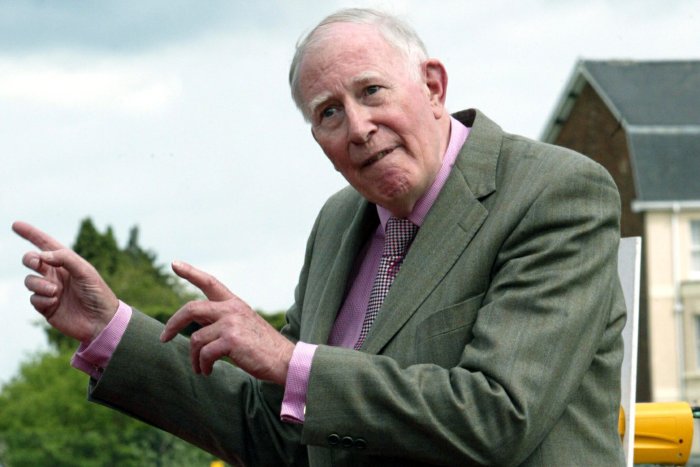
File Photo by Hugo Philpott/UPI
In 1994, the Channel Tunnel, a railway under the English Channel connecting Britain and France, was officially opened.
In 2001, John Paul II became the first pope to enter a mosque — the Umayyad Mosque in Damascus, Syria.
In 2006, the largest rebel group in Sudan’s Darfur region and the government of Sudan signed a peace agreement ending their three-year armed conflict that claimed an estimated 200,000 lives.
In 2009, Dave Bing, Hall of Fame star for the NBA’s Detroit Pistons, was elected mayor of Detroit, succeeding the ousted Kwame Kilpatrick.
In 2010, British voters gave the Conservatives control of Parliament, ultimately making David Cameron, 43, Britain’s youngest prime minister in almost 200 years.

File Photo by Hugo Philpott/UPI
In 2013, three women missing for 10 years were found alive in Cleveland. The man who had kept them as hostages pleaded guilty to charges including kidnapping and rape. He killed himself in prison.
In 2017, French lawmakers passed a bill that requires models to provide a doctor’s note to prove they are healthy, a bid to crack down on dangerously skinny models in the nation’s highly competitive fashion industry.
In 2023, King Charles III and Queen Camilla were crowned at Westminster Abbey in London in a lavish, eye-popping ceremony not seen in Britain in nearly 70 years.
In 2024, Columbia University handed out the Pulitzer Prizes, with journalism awards going to ProPublica, The New York Times, the Lookout Santa Cruz in California and The Washington Post.

File Photo by John Angelillo/UPI







